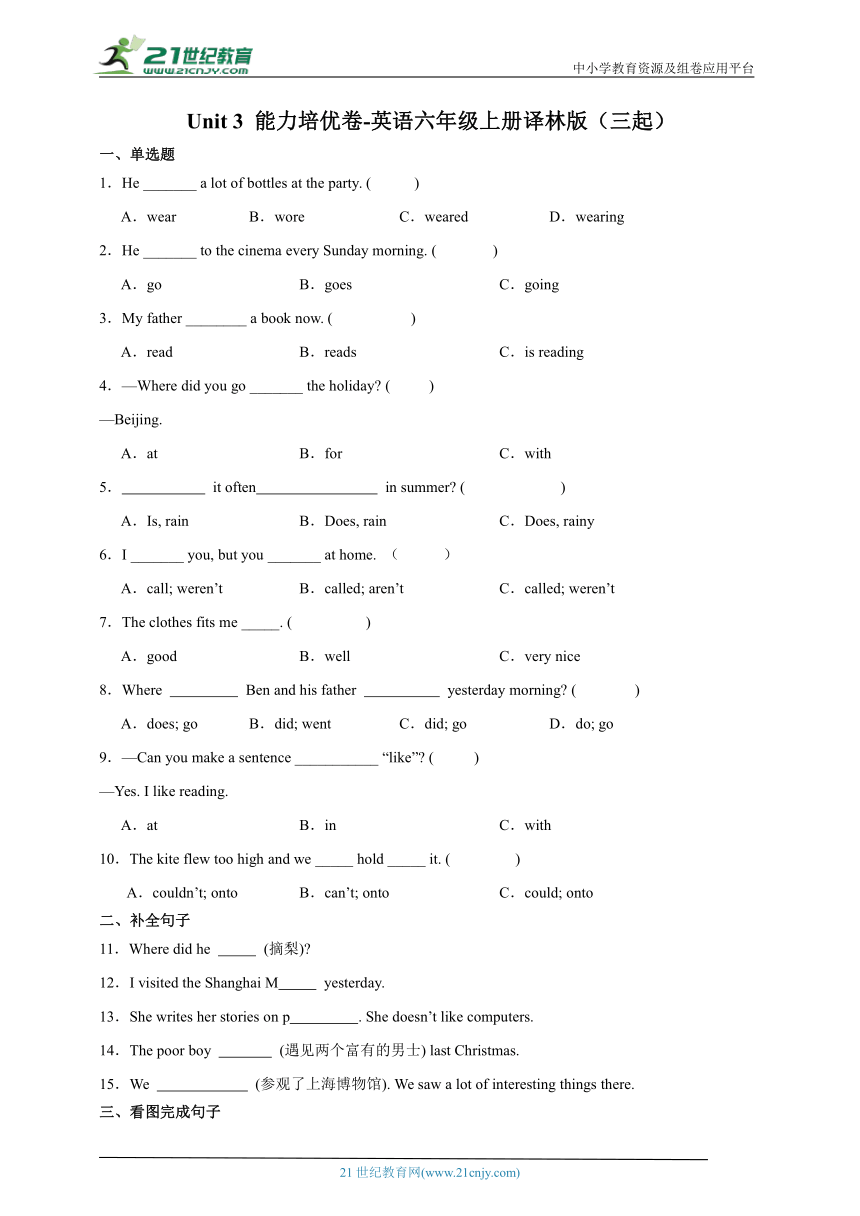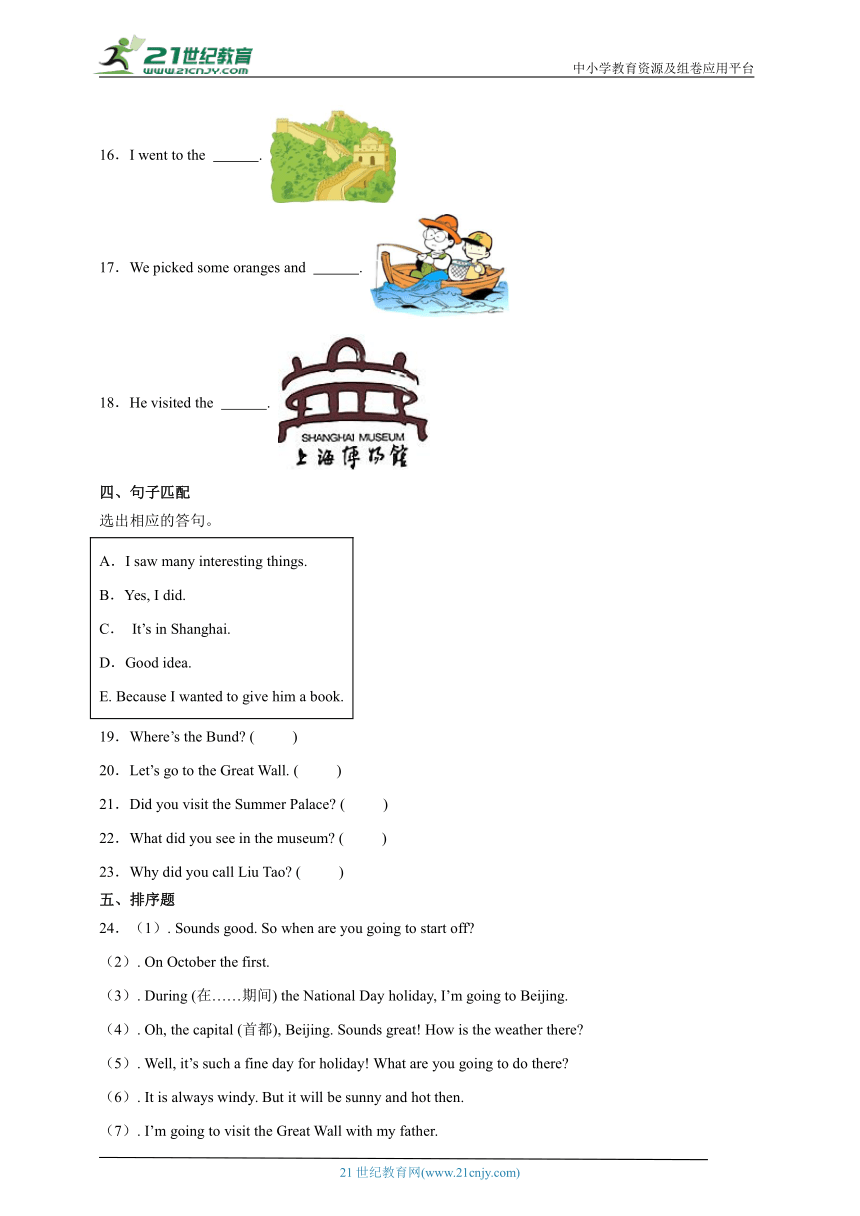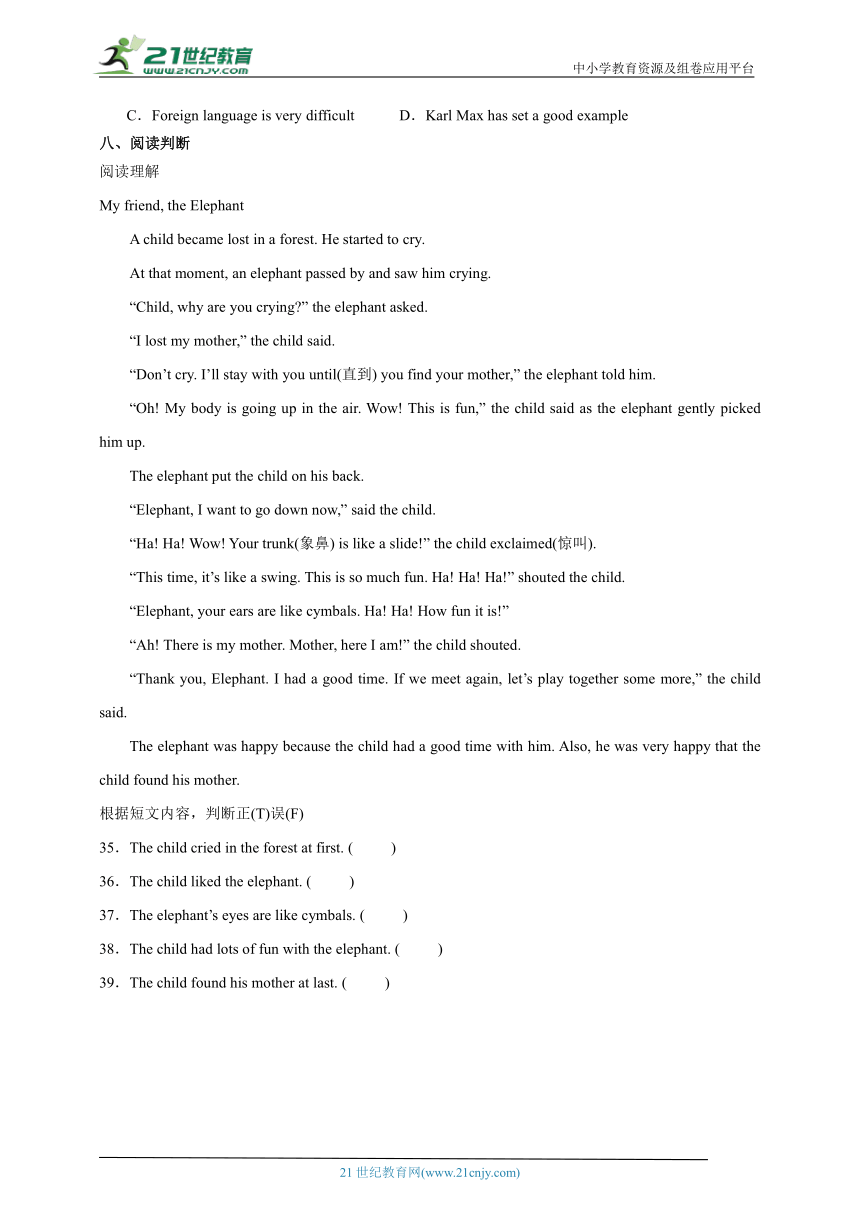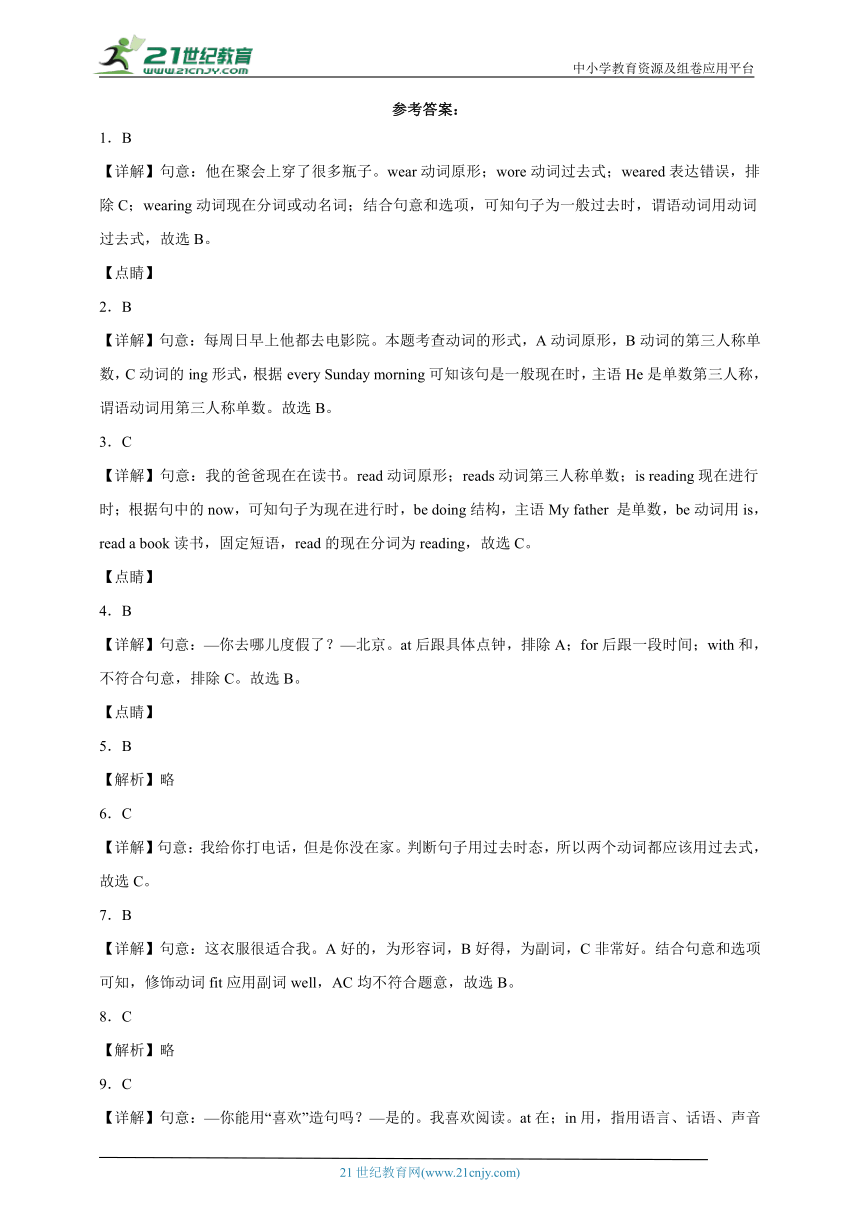Unit3能力培优卷-英语六年级上册译林版(三起)(含解析)
文档属性
| 名称 | Unit3能力培优卷-英语六年级上册译林版(三起)(含解析) |  | |
| 格式 | docx | ||
| 文件大小 | 1.2MB | ||
| 资源类型 | 试卷 | ||
| 版本资源 | 牛津译林版 | ||
| 科目 | 英语 | ||
| 更新时间 | 2023-09-21 12:33:13 | ||
图片预览





文档简介
中小学教育资源及组卷应用平台
Unit 3 能力培优卷-英语六年级上册译林版(三起)
一、单选题
1.He _______ a lot of bottles at the party. ( )
A.wear B.wore C.weared D.wearing
2.He _______ to the cinema every Sunday morning. ( )
A.go B.goes C.going
3.My father ________ a book now. ( )
A.read B.reads C.is reading
4.—Where did you go _______ the holiday ( )
—Beijing.
A.at B.for C.with
5. it often in summer ( )
A.Is, rain B.Does, rain C.Does, rainy
6.I _______ you, but you _______ at home. ( )
A.call; weren’t B.called; aren’t C.called; weren’t
7.The clothes fits me _____. ( )
A.good B.well C.very nice
8.Where Ben and his father yesterday morning ( )
A.does; go B.did; went C.did; go D.do; go
9.—Can you make a sentence ___________ “like” ( )
—Yes. I like reading.
A.at B.in C.with
10.The kite flew too high and we _____ hold _____ it. ( )
A.couldn’t; onto B.can’t; onto C.could; onto
二、补全句子
11.Where did he (摘梨)
12.I visited the Shanghai M yesterday.
13.She writes her stories on p . She doesn’t like computers.
14.The poor boy (遇见两个富有的男士) last Christmas.
15.We (参观了上海博物馆). We saw a lot of interesting things there.
三、看图完成句子
16.I went to the .
17.We picked some oranges and .
18.He visited the .
四、句子匹配
选出相应的答句。
A.I saw many interesting things. B.Yes, I did. C. It’s in Shanghai. D.Good idea. E. Because I wanted to give him a book.
19.Where’s the Bund ( )
20.Let’s go to the Great Wall. ( )
21.Did you visit the Summer Palace ( )
22.What did you see in the museum ( )
23.Why did you call Liu Tao ( )
五、排序题
24.(1). Sounds good. So when are you going to start off
(2). On October the first.
(3). During (在……期间) the National Day holiday, I’m going to Beijing.
(4). Oh, the capital (首都), Beijing. Sounds great! How is the weather there
(5). Well, it’s such a fine day for holiday! What are you going to do there
(6). It is always windy. But it will be sunny and hot then.
(7). I’m going to visit the Great Wall with my father.
排序:(3)→( )→( )→( )→( )→( )→(2)
六、中英互译:单词/短语
英汉互译。
25.see many interesting things .
26.go to a farm .
27.在星湖附近
28.pick some oranges .
29.去钓鱼 .
七、阅读选择
English is widely used throughout the world. So many people speak it as a second language. English is one of the most important subjects in middle school. Almost everyone knows that we should learn English well, but few of us know how to learn it well. Karl Marx has set a good example for us. He once said, “when one is learning a foreign language, he must use the foreign language.” In this way, he could use several languages. A saying goes, “Practice makes perfect.” When we learn English, we should read more, speak more, listen to English from time to time and practise writing every day. Don’t be afraid of making mistakes. Only in this way can we learn it well.
30.—Why do many people want to learn English well ( )
—Because ________.
A.English is very useful in the world. B.it’s easy to learn English well.
C.Karl Marx could learn English well. D.many people speak it as a second language.
31.What’s the meaning of the saying “Practice makes perfect.” ( )
A.练习会完美 B.熟能生巧 C.一技之长
32.—In which way, Karl Max could speak several languages ( )
—He ________.
A.learnt the language B.wrote the language
C.used the language D.listened to the language.
33.We can learn English well in this way. ( )
A.Be afraid of speaking English. B.Be afraid of making mistakes.
C.Listen to English once. D.Read more, speak more, write more and listen more.
34.What’s the best title of this passage ( )
A.English is very important B.How to learn English well
C.Foreign language is very difficult D.Karl Max has set a good example
八、阅读判断
阅读理解
My friend, the Elephant
A child became lost in a forest. He started to cry.
At that moment, an elephant passed by and saw him crying.
“Child, why are you crying ” the elephant asked.
“I lost my mother,” the child said.
“Don’t cry. I’ll stay with you until(直到) you find your mother,” the elephant told him.
“Oh! My body is going up in the air. Wow! This is fun,” the child said as the elephant gently picked him up.
The elephant put the child on his back.
“Elephant, I want to go down now,” said the child.
“Ha! Ha! Wow! Your trunk(象鼻) is like a slide!” the child exclaimed(惊叫).
“This time, it’s like a swing. This is so much fun. Ha! Ha! Ha!” shouted the child.
“Elephant, your ears are like cymbals. Ha! Ha! How fun it is!”
“Ah! There is my mother. Mother, here I am!” the child shouted.
“Thank you, Elephant. I had a good time. If we meet again, let’s play together some more,” the child said.
The elephant was happy because the child had a good time with him. Also, he was very happy that the child found his mother.
根据短文内容,判断正(T)误(F)
35.The child cried in the forest at first. ( )
36.The child liked the elephant. ( )
37.The elephant’s eyes are like cymbals. ( )
38.The child had lots of fun with the elephant. ( )
39.The child found his mother at last. ( )
参考答案:
1.B
【详解】句意:他在聚会上穿了很多瓶子。wear动词原形;wore动词过去式;weared表达错误,排除C;wearing动词现在分词或动名词;结合句意和选项,可知句子为一般过去时,谓语动词用动词过去式,故选B。
【点睛】
2.B
【详解】句意:每周日早上他都去电影院。本题考查动词的形式,A动词原形,B动词的第三人称单数,C动词的ing形式,根据every Sunday morning可知该句是一般现在时,主语He是单数第三人称,谓语动词用第三人称单数。故选B。
3.C
【详解】句意:我的爸爸现在在读书。read动词原形;reads动词第三人称单数;is reading现在进行时;根据句中的now,可知句子为现在进行时,be doing结构,主语My father 是单数,be动词用is,read a book读书,固定短语,read的现在分词为reading,故选C。
【点睛】
4.B
【详解】句意:—你去哪儿度假了?—北京。at后跟具体点钟,排除A;for后跟一段时间;with和,不符合句意,排除C。故选B。
【点睛】
5.B
【解析】略
6.C
【详解】句意:我给你打电话,但是你没在家。判断句子用过去时态,所以两个动词都应该用过去式,故选C。
7.B
【详解】句意:这衣服很适合我。A好的,为形容词,B好得,为副词,C非常好。结合句意和选项可知,修饰动词fit应用副词well,AC均不符合题意,故选B。
8.C
【解析】略
9.C
【详解】句意:—你能用“喜欢”造句吗?—是的。我喜欢阅读。at在;in用,指用语言、话语、声音等;with用,指用工具、手、口等;根据句意,C选项符合,故选C。
【点睛】
10.A
【详解】句意:那个风筝飞得太高了,我们能握不住它。根据flew可知该句是一般过去时,故C选项错误,根据句意可知A选项符合,故选A。
11.pick pears
【详解】句意:他在哪里摘梨?根据did可知句子是一般过去时,助动词用过去式,实义动词用原形,摘pick,梨pear,此处是泛指,用复数形式pears,故答案为pick pears。
【点睛】
12.Museum/useum
【详解】句意:我昨天参观了上海________。本题考查名词词组,根据句意及所给单词首字母可知,该空填Museum博物馆,Shanghai Museum上海博物馆,故答案为Museum。
13.paper/aper
【详解】句意:她在____上写她的故事。她不喜欢电脑。根据句意和首字母,可知考查单词paper纸,不可数名词,故答案为paper。
【点睛】
14.met two rich men
【详解】句意:去年圣诞节这个穷孩子遇见两个富有的男士。根据last Christmas可知句子是一般过去时,所以遇见用meet的过去式met;两个富有的男士要用man的复数形式men,所以是two rich men。故答案为met two rich men。
【点睛】
15.visited the Shanghai Museum
【详解】句意:我们参观了上海博物馆。我们在那里看到了很多有趣的东西。本题考查动词短语及动词的形式,参观了上海博物馆visit the Shanghai Museum,动词短语;根据后句中saw可知,句子是一般过去时,visit用过去式visited,故答案为visited the Shanghai Museum。
16.Great Wall
【详解】结合图片可知句意:我去了长城。长城the Great Wall,故答案为Great Wall。
17.went fishing
【详解】结合图片可知句意:我们摘了一些橙子和去钓鱼。去钓鱼go fishing,动词picked说明句子是一般过去时,go用过去式went,故答案为went fishing。
18.Shanghai Museum
【详解】句意:他参观上海博物馆。上海博物馆Shanghai Museum,故答案为Shanghai Museum。
【点睛】
19.C 20.D 21.B 22.A 23.E
【分析】所给选项汉语意思:
A. I saw many interesting things. 我看到了很多有趣的事情。
B. Yes, I did. 是的,我参观了。
C. It’s in Shanghai. 它在上海。
D. Good idea. 好主意。
E. Because I wanted to give him a book.因为我想给他一本书。
19.句意:外滩在哪?根据常识可知外滩在上海,C项符合题意。故选C。
20.句意:我们去长城吧。 对于建议要说自己的看法,选项D符合题意。故选D。
21.句意:你参观颐和园了吗?Did开头的一般疑问句,用did回答,选项B符合题意。故选B。
22.句意:你在博物馆看到了什么?答语回答在博物馆看到了什么,选项A符合题意。故选A。
23.句意:你为什么打电话给刘涛。Why提问用Because回答,选项E符合题意。故选E。
【点睛】
24. 4 6 5 7 1
【分析】所给句子意思是:听起来不错。那么你打算什么时候出发?
在十月一日。
在国庆节期间,我打算去北京。
噢,首都,北京。听起来很棒。那的天气怎么样?
嗯,真是个度假的好天气!你打算去那里做什么?
总是刮风。但是那时将会是晴朗炎热的。
我打算和爸爸一起去参观长城。
【详解】首句已经给出:在国庆节期间,我打算去北京。During (在......期间) the National Day holiday, I’m going to Beijing.
接着问天气状况:噢,首都,北京。听起来很棒。那的天气怎么样?Oh, the capital (首都), Beijing. Sounds great! How is the weather there
然后回答天气状况:总是刮风。但是那时将会是晴朗炎热的。It is always windy. But it will be sunny and hot then.
接着问计划做的事情:嗯,真是个度假的好天气!你打算去那里做什么?Well, it’s such a fine day for holiday! What are you going to do there
然后回答做的事情:我打算和爸爸一起去参观长城。I’m going to visit the Great Wall with my father.
接着问出发的时间:听起来不错。那么你打算什么时候出发?Sounds good. So when are you going to start off
最后回答日期:在十月一日。On October the first.
故答案为46571。
25.看见很多有趣的事 26.去农场 27.near the Xinghu 28.摘一些橘子 29.go fishing
【解析】25.see看见,many许多,interesting有趣的,things事情,故答案为看见很多有趣的事。
26.go to意为去,a farm农场,故答案为去农场。
27.星湖应用the Xinghu,其前应用介词newr,意为在……附近,故答案为near the Xinghu。
28.pick摘,some一些,oranges橘子,故答案为摘一些橘子。
29.去钓鱼应用go fishing,为固定用法,故答案为go fishing。
30.A 31.B 32.C 33.D 34.B
【导语】本文介绍了如何学好英语。
30.题干句意:—为什么很多人想学好英语?—因为________。A英语在世界上很有用。B学好英语很容易。C卡尔·马克思能学好英语。D许多人把它作为第二语言。根据“English is widely used throughout the world. So many people speak it as a second language.”可知是在世界上广泛使用,很有用,故选A。
31.题干句意:“Practice makes perfect.”这句话是什么意思?根据“When we learn English, we should read more, speak more, listen to English from time to time and practise writing every day.”可知是熟能生巧,故选B。
32.题干句意:—通过哪种方式,卡尔·马克斯会说几种语言?—他________。A学会了语言,B写了语言,C用了语言,D听了语言。根据“He once said, ‘when one is learning a foreign language, he must use the foreign language.’”可知是使用语言,故选C。
33.题干句意:我们可以用这种方式学好英语_______。A害怕说英语。B害怕犯错误。C听英语一次。D多读,多说,多写,多听。根据“When we learn English, we should read more, speak more, listen to English from time to time and practise writing every day.”可知要D多读,多说,多写,多听。故选D。
34.题干句意:这篇文章最好的标题是什么?A英语很重要,B如何学好英语,C外语很难,D卡尔·马克斯树立了一个好榜样,根据“Only in this way can we learn it well.”和文章内容可知是如何学好英语,故选B。
35.T 36.T 37.F 38.T 39.T
【解析】略
21世纪教育网 www.21cnjy.com 精品试卷·第 2 页 (共 2 页)
21世纪教育网(www.21cnjy.com)
Unit 3 能力培优卷-英语六年级上册译林版(三起)
一、单选题
1.He _______ a lot of bottles at the party. ( )
A.wear B.wore C.weared D.wearing
2.He _______ to the cinema every Sunday morning. ( )
A.go B.goes C.going
3.My father ________ a book now. ( )
A.read B.reads C.is reading
4.—Where did you go _______ the holiday ( )
—Beijing.
A.at B.for C.with
5. it often in summer ( )
A.Is, rain B.Does, rain C.Does, rainy
6.I _______ you, but you _______ at home. ( )
A.call; weren’t B.called; aren’t C.called; weren’t
7.The clothes fits me _____. ( )
A.good B.well C.very nice
8.Where Ben and his father yesterday morning ( )
A.does; go B.did; went C.did; go D.do; go
9.—Can you make a sentence ___________ “like” ( )
—Yes. I like reading.
A.at B.in C.with
10.The kite flew too high and we _____ hold _____ it. ( )
A.couldn’t; onto B.can’t; onto C.could; onto
二、补全句子
11.Where did he (摘梨)
12.I visited the Shanghai M yesterday.
13.She writes her stories on p . She doesn’t like computers.
14.The poor boy (遇见两个富有的男士) last Christmas.
15.We (参观了上海博物馆). We saw a lot of interesting things there.
三、看图完成句子
16.I went to the .
17.We picked some oranges and .
18.He visited the .
四、句子匹配
选出相应的答句。
A.I saw many interesting things. B.Yes, I did. C. It’s in Shanghai. D.Good idea. E. Because I wanted to give him a book.
19.Where’s the Bund ( )
20.Let’s go to the Great Wall. ( )
21.Did you visit the Summer Palace ( )
22.What did you see in the museum ( )
23.Why did you call Liu Tao ( )
五、排序题
24.(1). Sounds good. So when are you going to start off
(2). On October the first.
(3). During (在……期间) the National Day holiday, I’m going to Beijing.
(4). Oh, the capital (首都), Beijing. Sounds great! How is the weather there
(5). Well, it’s such a fine day for holiday! What are you going to do there
(6). It is always windy. But it will be sunny and hot then.
(7). I’m going to visit the Great Wall with my father.
排序:(3)→( )→( )→( )→( )→( )→(2)
六、中英互译:单词/短语
英汉互译。
25.see many interesting things .
26.go to a farm .
27.在星湖附近
28.pick some oranges .
29.去钓鱼 .
七、阅读选择
English is widely used throughout the world. So many people speak it as a second language. English is one of the most important subjects in middle school. Almost everyone knows that we should learn English well, but few of us know how to learn it well. Karl Marx has set a good example for us. He once said, “when one is learning a foreign language, he must use the foreign language.” In this way, he could use several languages. A saying goes, “Practice makes perfect.” When we learn English, we should read more, speak more, listen to English from time to time and practise writing every day. Don’t be afraid of making mistakes. Only in this way can we learn it well.
30.—Why do many people want to learn English well ( )
—Because ________.
A.English is very useful in the world. B.it’s easy to learn English well.
C.Karl Marx could learn English well. D.many people speak it as a second language.
31.What’s the meaning of the saying “Practice makes perfect.” ( )
A.练习会完美 B.熟能生巧 C.一技之长
32.—In which way, Karl Max could speak several languages ( )
—He ________.
A.learnt the language B.wrote the language
C.used the language D.listened to the language.
33.We can learn English well in this way. ( )
A.Be afraid of speaking English. B.Be afraid of making mistakes.
C.Listen to English once. D.Read more, speak more, write more and listen more.
34.What’s the best title of this passage ( )
A.English is very important B.How to learn English well
C.Foreign language is very difficult D.Karl Max has set a good example
八、阅读判断
阅读理解
My friend, the Elephant
A child became lost in a forest. He started to cry.
At that moment, an elephant passed by and saw him crying.
“Child, why are you crying ” the elephant asked.
“I lost my mother,” the child said.
“Don’t cry. I’ll stay with you until(直到) you find your mother,” the elephant told him.
“Oh! My body is going up in the air. Wow! This is fun,” the child said as the elephant gently picked him up.
The elephant put the child on his back.
“Elephant, I want to go down now,” said the child.
“Ha! Ha! Wow! Your trunk(象鼻) is like a slide!” the child exclaimed(惊叫).
“This time, it’s like a swing. This is so much fun. Ha! Ha! Ha!” shouted the child.
“Elephant, your ears are like cymbals. Ha! Ha! How fun it is!”
“Ah! There is my mother. Mother, here I am!” the child shouted.
“Thank you, Elephant. I had a good time. If we meet again, let’s play together some more,” the child said.
The elephant was happy because the child had a good time with him. Also, he was very happy that the child found his mother.
根据短文内容,判断正(T)误(F)
35.The child cried in the forest at first. ( )
36.The child liked the elephant. ( )
37.The elephant’s eyes are like cymbals. ( )
38.The child had lots of fun with the elephant. ( )
39.The child found his mother at last. ( )
参考答案:
1.B
【详解】句意:他在聚会上穿了很多瓶子。wear动词原形;wore动词过去式;weared表达错误,排除C;wearing动词现在分词或动名词;结合句意和选项,可知句子为一般过去时,谓语动词用动词过去式,故选B。
【点睛】
2.B
【详解】句意:每周日早上他都去电影院。本题考查动词的形式,A动词原形,B动词的第三人称单数,C动词的ing形式,根据every Sunday morning可知该句是一般现在时,主语He是单数第三人称,谓语动词用第三人称单数。故选B。
3.C
【详解】句意:我的爸爸现在在读书。read动词原形;reads动词第三人称单数;is reading现在进行时;根据句中的now,可知句子为现在进行时,be doing结构,主语My father 是单数,be动词用is,read a book读书,固定短语,read的现在分词为reading,故选C。
【点睛】
4.B
【详解】句意:—你去哪儿度假了?—北京。at后跟具体点钟,排除A;for后跟一段时间;with和,不符合句意,排除C。故选B。
【点睛】
5.B
【解析】略
6.C
【详解】句意:我给你打电话,但是你没在家。判断句子用过去时态,所以两个动词都应该用过去式,故选C。
7.B
【详解】句意:这衣服很适合我。A好的,为形容词,B好得,为副词,C非常好。结合句意和选项可知,修饰动词fit应用副词well,AC均不符合题意,故选B。
8.C
【解析】略
9.C
【详解】句意:—你能用“喜欢”造句吗?—是的。我喜欢阅读。at在;in用,指用语言、话语、声音等;with用,指用工具、手、口等;根据句意,C选项符合,故选C。
【点睛】
10.A
【详解】句意:那个风筝飞得太高了,我们能握不住它。根据flew可知该句是一般过去时,故C选项错误,根据句意可知A选项符合,故选A。
11.pick pears
【详解】句意:他在哪里摘梨?根据did可知句子是一般过去时,助动词用过去式,实义动词用原形,摘pick,梨pear,此处是泛指,用复数形式pears,故答案为pick pears。
【点睛】
12.Museum/useum
【详解】句意:我昨天参观了上海________。本题考查名词词组,根据句意及所给单词首字母可知,该空填Museum博物馆,Shanghai Museum上海博物馆,故答案为Museum。
13.paper/aper
【详解】句意:她在____上写她的故事。她不喜欢电脑。根据句意和首字母,可知考查单词paper纸,不可数名词,故答案为paper。
【点睛】
14.met two rich men
【详解】句意:去年圣诞节这个穷孩子遇见两个富有的男士。根据last Christmas可知句子是一般过去时,所以遇见用meet的过去式met;两个富有的男士要用man的复数形式men,所以是two rich men。故答案为met two rich men。
【点睛】
15.visited the Shanghai Museum
【详解】句意:我们参观了上海博物馆。我们在那里看到了很多有趣的东西。本题考查动词短语及动词的形式,参观了上海博物馆visit the Shanghai Museum,动词短语;根据后句中saw可知,句子是一般过去时,visit用过去式visited,故答案为visited the Shanghai Museum。
16.Great Wall
【详解】结合图片可知句意:我去了长城。长城the Great Wall,故答案为Great Wall。
17.went fishing
【详解】结合图片可知句意:我们摘了一些橙子和去钓鱼。去钓鱼go fishing,动词picked说明句子是一般过去时,go用过去式went,故答案为went fishing。
18.Shanghai Museum
【详解】句意:他参观上海博物馆。上海博物馆Shanghai Museum,故答案为Shanghai Museum。
【点睛】
19.C 20.D 21.B 22.A 23.E
【分析】所给选项汉语意思:
A. I saw many interesting things. 我看到了很多有趣的事情。
B. Yes, I did. 是的,我参观了。
C. It’s in Shanghai. 它在上海。
D. Good idea. 好主意。
E. Because I wanted to give him a book.因为我想给他一本书。
19.句意:外滩在哪?根据常识可知外滩在上海,C项符合题意。故选C。
20.句意:我们去长城吧。 对于建议要说自己的看法,选项D符合题意。故选D。
21.句意:你参观颐和园了吗?Did开头的一般疑问句,用did回答,选项B符合题意。故选B。
22.句意:你在博物馆看到了什么?答语回答在博物馆看到了什么,选项A符合题意。故选A。
23.句意:你为什么打电话给刘涛。Why提问用Because回答,选项E符合题意。故选E。
【点睛】
24. 4 6 5 7 1
【分析】所给句子意思是:听起来不错。那么你打算什么时候出发?
在十月一日。
在国庆节期间,我打算去北京。
噢,首都,北京。听起来很棒。那的天气怎么样?
嗯,真是个度假的好天气!你打算去那里做什么?
总是刮风。但是那时将会是晴朗炎热的。
我打算和爸爸一起去参观长城。
【详解】首句已经给出:在国庆节期间,我打算去北京。During (在......期间) the National Day holiday, I’m going to Beijing.
接着问天气状况:噢,首都,北京。听起来很棒。那的天气怎么样?Oh, the capital (首都), Beijing. Sounds great! How is the weather there
然后回答天气状况:总是刮风。但是那时将会是晴朗炎热的。It is always windy. But it will be sunny and hot then.
接着问计划做的事情:嗯,真是个度假的好天气!你打算去那里做什么?Well, it’s such a fine day for holiday! What are you going to do there
然后回答做的事情:我打算和爸爸一起去参观长城。I’m going to visit the Great Wall with my father.
接着问出发的时间:听起来不错。那么你打算什么时候出发?Sounds good. So when are you going to start off
最后回答日期:在十月一日。On October the first.
故答案为46571。
25.看见很多有趣的事 26.去农场 27.near the Xinghu 28.摘一些橘子 29.go fishing
【解析】25.see看见,many许多,interesting有趣的,things事情,故答案为看见很多有趣的事。
26.go to意为去,a farm农场,故答案为去农场。
27.星湖应用the Xinghu,其前应用介词newr,意为在……附近,故答案为near the Xinghu。
28.pick摘,some一些,oranges橘子,故答案为摘一些橘子。
29.去钓鱼应用go fishing,为固定用法,故答案为go fishing。
30.A 31.B 32.C 33.D 34.B
【导语】本文介绍了如何学好英语。
30.题干句意:—为什么很多人想学好英语?—因为________。A英语在世界上很有用。B学好英语很容易。C卡尔·马克思能学好英语。D许多人把它作为第二语言。根据“English is widely used throughout the world. So many people speak it as a second language.”可知是在世界上广泛使用,很有用,故选A。
31.题干句意:“Practice makes perfect.”这句话是什么意思?根据“When we learn English, we should read more, speak more, listen to English from time to time and practise writing every day.”可知是熟能生巧,故选B。
32.题干句意:—通过哪种方式,卡尔·马克斯会说几种语言?—他________。A学会了语言,B写了语言,C用了语言,D听了语言。根据“He once said, ‘when one is learning a foreign language, he must use the foreign language.’”可知是使用语言,故选C。
33.题干句意:我们可以用这种方式学好英语_______。A害怕说英语。B害怕犯错误。C听英语一次。D多读,多说,多写,多听。根据“When we learn English, we should read more, speak more, listen to English from time to time and practise writing every day.”可知要D多读,多说,多写,多听。故选D。
34.题干句意:这篇文章最好的标题是什么?A英语很重要,B如何学好英语,C外语很难,D卡尔·马克斯树立了一个好榜样,根据“Only in this way can we learn it well.”和文章内容可知是如何学好英语,故选B。
35.T 36.T 37.F 38.T 39.T
【解析】略
21世纪教育网 www.21cnjy.com 精品试卷·第 2 页 (共 2 页)
21世纪教育网(www.21cnjy.com)
